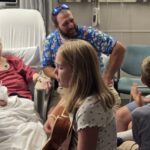To mark National Health Care Decisions Day, UPMC will host a teleconference at noon Tuesday where the public and members of the faith community can join UPMC medical experts to discuss advance care planning. The Day of Conversation is meant to encourage these conversations with family members, clergy and physicians so that important health care decisions can be made before a person may be unable to make them. To join the teleconference, call 877-228-2184, access code 111835.
 We sat down with Dr. Andrew Thurston, medical director of palliative care at UPMC Mercy, to learn more about the teleconference and its importance.
We sat down with Dr. Andrew Thurston, medical director of palliative care at UPMC Mercy, to learn more about the teleconference and its importance.
What is the purpose of the teleconference?
A. UPMC observes National Health Care Decisions Day each year. It’s a time that we hope to draw attention to the need for advance care planning, or making end-of-life decisions before it’s too late and the burden is then on surviving family members. This year, we wanted to provide access to our medical experts and members of the faith-based community to answer questions so that we can help get these conversations started among family members. That’s often the most difficult step.
Why are you focusing on spiritual leaders in this teleconference?
A. During times of acute illness or crisis, a person’s faith, spirituality and values become a factor. Many will approach their faith leaders at this time because they have long-established personal relationships, and a faith leader can be a significant source of comfort and strength. During this teleconference, we want to help empower faith leaders to start these advanced care conversations with their congregants. Again, it’s hard to start the conversation, and faith leaders can be a catalyst for addressing these conversations among family members.
Why do you think it’s difficult for family members to have these conversations?
A. There have been some studies conducted on this issue showing that the majority of people – some 90 percent – realize the importance of having advanced care planning, but only 30 percent actually talk about it. I think many of us put it off. We believe we will get around to it eventually and that there is plenty of time. Unfortunately, a crisis can happen at any time, and the most difficult time to decide these matters is during a crisis. I’ve heard many say, “If only we had a clear understanding of our loved one’s wishes.” I see this play out too many times. I know it’s important for families or friends to come together to just talk. This teleconference will help get those conversations started sooner rather than later.









